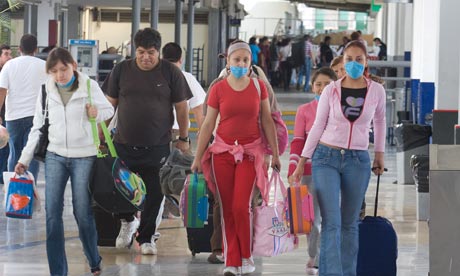
In Playa del Carmen, jewel of the Mayan Riviera and one of Mexico's hottest spots, the beach was already quiet and the hotels only half-full even a fortnight ago. The reason, explained my guide as we set off for a day at the Mayan ruins at Koba, was obvious: the economic slowdown is affecting the holiday industry the world over. But there was another reason, too, why the tourists were thinking twice before booking tickets to the international airport at Cancun: a few weeks ago President Felipe Calderon escalated his war on the drugs barons, and newspapers the world over have been full of reports on just how bloody that war is, with 8,000 people dead in the last two years.
So, my guide was already pessimistic about prospects for tourism in Mexico in 2009 - and that was before she'd ever heard of "la grippe porcine".
She's certainly heard of it now: more than 1,600 people in Mexico have been struck by swine flu, and 103 people are dead - and the figure is bound to rise. It's a tiny percentage of the population of Mexico - there are 23 million in Mexico City alone - but that's not the point. The point is that front-page photographs of people in surgical masks, praying to the Virgin of Guadalupe for deliverance from a terrifying disease sweeping through their community, is the very last thing Mexican tourism needed.
At the Mexico Tourist Board in London, staff were today fielding calls from worried would-be travellers wondering if they should cancel their holidays: more UK tourists have been travelling to Mexico in recent years (315,000, according to the latest figures), as an area put on the map by US and Canadian visitors has begun to open up to travellers from here, too. "What we've told callers," said Lupita Ayala, "is that Mexico City, where this outbreak is, is a long way from Cancun. People don't realise the geography of the place. They don't realise how great the distances involved are, and they're reassured by that."
Ayala certainly hopes she'll be able to spread reassurance - but with today's news that the EU health commissioner, Andorra Vassiliou, has cautioned against travel to Mexico for anything other than a "very urgent" reason, things aren't looking good. The tragedy for Mexico, a country economic analysts say could be particularly badly hit by the economic slowdown, is that tourism appeared to be one ray of hope, and last year was worth about US $13 billion to its coffers.
But perception of a country is the crucial ingredient in pulling in tourists, and the current image of Mexico on the world stage isn't healthy. Making things even worse is the fact that its capital city has the same name as the country, and many people don't distinguish between the two. The truth is that, just as the epicentre of the drugs war is hundreds of miles away from the azure waters of the Caribbean coastline on the US border, so the flu outbreak is a two-hour flight away from the seaside resorts, too. But for those about to book their 2009 holiday, that distinction may well be academic.

